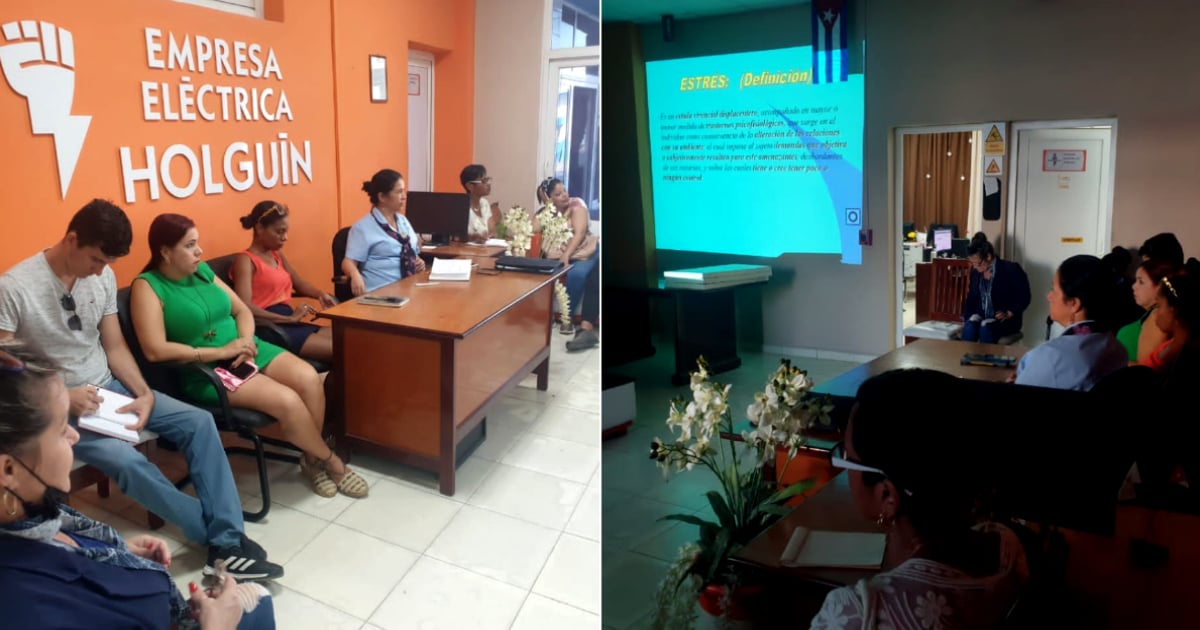The Unión Eléctrica de Cuba (UNE) faces the brunt of public outrage as Cubans endure power outages lasting up to 18 hours a day. In response, the Electric Company of Holguín has deemed it necessary to hire a psychologist to help manage the stress this situation places on its employees.
Like any ordinary Cuban, electrical sector workers in Cuba bear the additional burden of maintaining service, even at minimal levels. These workers must face the public, answer numerous calls from citizens seeking information or reporting power outages in their areas, collect payment for electrical services that may be non-existent, and perform other tasks that add pressure to their already stressful lives. They are affected by shortages, low wages, high prices, power outages, lack of public transportation, and a generalized crisis.
“Stress is a state of physical and emotional tension triggered by a stimulus or pressure, whether positive or negative. It is a defense mechanism that, in small doses, helps the body react and adapt to events,” stated the Electric Company of Holguín on social media. To discuss “its implications and effects,” the state-owned company invited Lic. José Luis Cruz Alonso to give a talk on this topic during the monthly union and communication meeting.
“It was a fitting moment to debate this phenomenon inherent in the current social context,” the Electric Company of Holguín noted, acknowledging that stress is an “inherent” part of the current energy crisis. Unable to resolve the collapse of the national electro-energy system (SEN), as well as other severe issues like inflation or food production, the Cuban regime is desperately seeking new ways to keep its failing propaganda alive, which most Cubans reject.
From "spiritual forces" to "psychological care": The regime's propaganda deepens its decline. The use of “psychological care” as part of the social control exerted by the regime is part of a long-standing manipulative vision, exemplified by the long-running TV show “Vale la pena” hosted by psychologist Manuel Calviño. The initiative by the Electric Company of Holguín aims to address the morale of its workers, normalizing their stress to prevent them from taking actions such as quitting or expressing political dissent.
The strategy of "releasing pressure" without focusing the “stressed” on the government’s management has resulted in absurd situations. For instance, a recent declaration by a Cuban spiritualist association (Proyecto sociocultural Cabildo Quisicuaba) promised to save the nation, the revolution, and socialism.
“We must unleash the productive forces and also the spiritual forces of the Revolution,” said ruler Miguel Díaz-Canel in mid-December last year. “This is the path to strengthen Cuban pride,” he added. One of his loyalists, recently removed from her position in Matanzas, said in September 2022: “Ashé for all Cubans, ashé for the Cuban revolution.” Her wishes were heard, and Díaz-Canel included her in his “movement of cadres” agenda in late March, removing her from her position as the first secretary of the Communist Party in that province.
When Susely Morfa González was blessing the so-called “revolution,” Díaz-Canel was calling to work “with people’s spirituality” and lecturing on “the need to transform people’s spiritual dimension for good.”
The intellectual poverty and moral indigence of the regime’s propagandists are driving their political discourse to unprecedented levels of absurdity and ridicule. The communist regime aims to tackle the intangible to save the “revolution” with help from the beyond, whether through “cosmic energy” or developing “spiritual forces” among Cubans to rediscover the “mythical breath of the revolution.”
While Díaz-Canel calls to “rediscover the paths of legend and heroism,” other followers of his strategy end up ousted, like former Economy and Planning Minister Alejandro Gil Fernández, who appealed to faith to cope with the misery caused by his policies. “We know it is complicated to find daily food, endure power outages of eight to ten hours, and deal with transportation issues... but trust, the only way out is the revolution and socialism,” said the official, who now contemplates life’s brevity in the cells of Villa Marista.
The systemic and widespread crisis in Cuba cannot be solved by appealing to “spiritual forces” or a better understanding of the human psyche but in the realm of politics, social dialogue, and the political will to initiate a radical change process—something Calviño or Cruz Alonso likely ponder but would never dare to say aloud.
Addressing Worker Stress in Cuba's Electric Sector
Given the context of the article, the following questions and answers provide further insight into the measures taken to address worker stress in Cuba's electric sector.
Why did the Electric Company of Holguín hire a psychologist?
The Electric Company of Holguín hired a psychologist to help manage the stress experienced by workers due to long power outages and the additional pressures of their job responsibilities.
What tasks add to the stress of electrical sector workers in Cuba?
Workers must face the public, answer numerous calls from citizens, collect payment for non-existent services, and perform other tasks that add pressure to their lives, which are already affected by shortages, low wages, high prices, power outages, and lack of public transportation.
What was the purpose of inviting Lic. José Luis Cruz Alonso to speak?
Lic. José Luis Cruz Alonso was invited to discuss the implications and effects of stress during the monthly union and communication meeting, providing workers with insights on managing their stress.
What does the Cuban regime's strategy of "releasing pressure" involve?
The strategy involves addressing the morale of workers to normalize their stress and prevent them from taking actions like quitting or expressing political dissent, without focusing on the government’s management.
